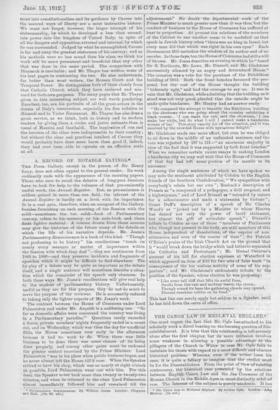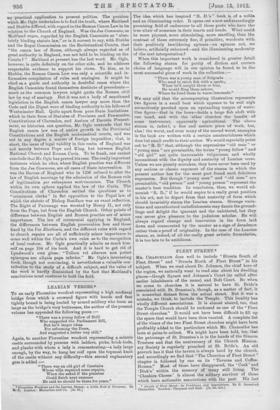THE CANON LAW IN MEDIEVAL ENGIANB.*' One must regret the
fact that Mr. Ogle has attached to his scholarly work a direct bearing on the burning question of Die- establishment. It is trim that this relationship is left severely alone after the filed chapter, but its mere intension involves some weakness in allowing ' a possible- advanta0- to ~the pillagers of' the Church in•Walee in case Mr.- Ogle fails to maintain his thesis with regard to a most diffithat'and obscure historical problem.- Whereas, even if the writer- loses his ease, it quite a fillacy to imagine that the verdict must be for the Disestablishers. From the point of 7Vitor- of' eriathig controversy, the historical case presented by the relations between Engliah' ()anon 'Law and the Tue. Commune of the Roman Church in the Middle Ages is mostr4istinctly nihil ad rent. The interest of the subject is purelyaeademic. It has The Canon Law ln Mcdizroal England.' By Arthur Oglo.---London: :JOttn* Murray. [es. not.]
no • practical application to present politics. The problem which Mr. Ogle undertakes is to find the truth, where Maitland and Stubbs differed, with regard to the Roman Canon Law in its relation to the Church of England. Was the Jus Commune, as Maitland urges, regarded by the English Canoniste as " abso- lutely binding statute law," or is it correct to say, with Stubbs and the Royal Commission on the Ecclesiastical Courts, that "the canon law of Rome, although always regarded as of great authority in England, was not held to be binding on the Courts P " Maitland at present has the last word. Mr. Ogle, however, is quite definitely on the other side, and he adduces respectable evidence to support his views. To line as to Stubbs, the Roman Canon Law was only a scientific and in- formative compilation of rules and analogies. It might be cited as a guide and authority in doubtful cases where the English Canoniats found themselves destitute of precedents— much as the common lawyers might quote the Roman civil law by way of analogy. But it was not a body of sanctioned legislation, to the English canon lawyer any more than the Code and the Digest were of binding authority to his fellows of Westminster Hall. Quite apart from pure State limitations which in their form of Statutes of Provisory and Prcemunire, Constitutions of Clarendon, and Assizes of Darrein Present- ment, no historian can question, Mr. Ogle contends that the English canon law was of native growth in the Provincial Constitutions and the English ecclesiastical courts, and was not in any degree a matter of foreign imposition; that, in short, the issue of legal validity in this realm of England was not merely between Pope and King, but between English National Church and Roman Curia. To be frank, one cannot conclude that Mr. Ogle has proved his case. The really important instances which he cites, where English practice was different from the Jut Commune, are all cases of State intervention. It was the Barons of England who in 1236 refused to alter the law of English marriage by the admission of the Roman rule of legitimation per subsequent matrimonium. The Church within its own sphere applied the law of the Curia. The Constitutions of Clarendon settled the questions as to " eriminous clerks " in flat opposition to the Papal law, of which the statute of Bishop Boniface was an exact reflection. The Right of Patronage was wrested by Henry H., not only from the Pope, but from the English Church. Other points of difference between English and Roman practice are of minor importance. The law of ceremonial applying in England, the differences between English procuration fees and those fixed by the Vas Electionie, and the different rules with regard to church repairs are all of sufficiently minor importance to come well within the Curia's own rules as to the recognition of local custom. Mr. Ogle practically admits as much him- self on page 104 of his book. And it is hard to get rid of Lyndwood's own gloss: " Tollere vel alterare non potest episcopus nec aliquis papa inferior." Mr. Ogle's interesting book, though not convincing, is nevertheless a valuable con- tribution to the study of a difficult subject, and the value of the work is hardly diminished by the fact that Maitland's conclusions must continue to hold the field.











































 Previous page
Previous page